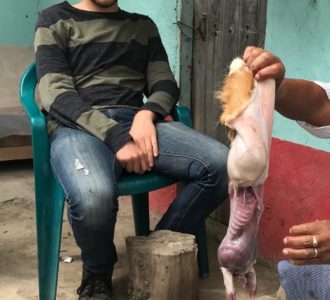I have my introduction down pat in both English and Spanish.
“Este año estoy viviendo con una familia indigena, enseñando inglés en una escuela pública y experimentando la cultura aquí”
This year, I am living with an Indigenous family, teaching English at the local public school, and experiencing the culture here!
Without fail, I let everyone know that I am living with an Indigenous family, whether they ask or not. I am also quick to note the fun rituals and experiences only living with an Indigenous family in Ecuador gives you: eating in the cemetery with the dead, getting puro* spit on you when you have a fever, and getting a cuy** rubbed all over you to cut it open and assess your health. I tell people how my family often speaks Kitchwa, the native language of Ecuador before the Spaniards and Inca colonized the land, deftly leaving me out of specific conversations.
But how much am I utilizing the word “Indigenous” to get brownie points for my “unique” and “intangible” experience from people back home? In general, Americans see Indigenous populations of the Americas as very different than themselves, a culture somewhat abstract. Am I trying to make my life sound more exotic than it actually is to prove how “brave” and “humble” I am by taking this gap year?
In many expat publications, when helping the poor, they are always quick to add the word “Indigenous”. There are both rich Mestizos and rich Indigenous, both poor Indigenous and poor Mestizos. So why say that every disadvantaged person receiving help is Indigenous? Yes, they have a different way of dressing up for events. Yes, men often wear their hair in a long braid. Yes, many of them speak a different language when conversing with one another. But, these factors are so much smaller than they sound. They live in the same cinder block houses, have hot running water, and for the most part, worship the same religious figures as Mestizos and Afro-Ecuadorians.
When living in a diverse country, there are common cross-cultural experiences everyone in the larger society experiences. Indigenous communities often attend gatherings, be it sporting events or markets, where they mix with people of different backgrounds and races. Indigenous people are part of Ecuadorian culture. However, by intentionally or unintentionally failing to address details of the specific subgroup in context with the larger society, one allows stereotypes and the single story to grow. Going to a diverse public school is just as “Indigenous” as eating in the cemetery with the deceased. By only relaying the unique events I experience as part of an Indigenous family, I fail to depict an accurate picture of what the larger Indigenous culture and life is like.
Instead of jumping to the Indigenous parts of my experiences first, I will bring up this unique part of my life here when it is actually relevant. Right off the bat, I shouldn’t be waving the Indigenous identity of my host family if I don’t have the time or space to convey it in the honest way I should. This means: when talking in passing to tourist I run into in the city nearby, and we aren’t going to sit down for an hour and talk about Ecuador, I shouldn’t throw in the buzzword “Indigenous” if I’m not going to fully elaborate on my experience here with them.
In conveying my time in Ecuador, I have been overly eager to selectively use words that make my situation sound more foreign to my American network. Trying to make my experience here into something that “reads” or “engages” better to people back home betrays the narrative of my year. As the countdown strikes one month, I need to be vigilant with my choice of words when communicating my experience, both in country and when I get home. My family and culture here is not something to be wielded for my benefit. The Ecuadorian Indigenous culture is to be celebrated and expressed in a candid way: how it has truly been a part of my life here.
*Puro is an alcohol made from sugar cane
**Cuy means guinea pig, a very important animal for both eating and celebrating in the Indigenous culture
